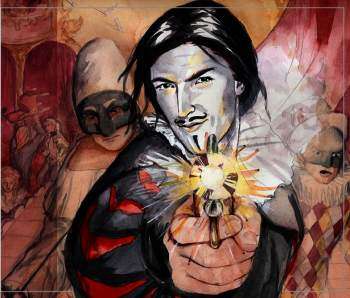Scaramouche

"He was born with a gift of laughter and a sense that the world was mad."
So begins Rafael Sabatini's classic novel of revenge. First published in 1921, this is the story of Andre-Louis Moreau's life in The French Revolution. After his friend is killed by a powerful noble, the Marquis de La Tour d'Azyr, Andre-Louis' quest for vengeance leads him to become an orator inciting the people of France to rebel. Along the way, he becomes a renowned actor for his role as Scaramouche — the sly, roguish trickster. This novel was adapted for film twice, but much like Captain Blood and The Sea Hawk, it lost something in the translation. The second movie does, however, feature one of the most epic sword fights ever committed to celluloid.
- Abhorrent Admirer: The Marquis becomes this to Aline; twisted in that, although she had been quite receptive to the thought of marrying him before, discovering some unsavory facts about him destroys her interest.
- Affably Evil: The Marquis is so polite during his conversation with Andre-Louis and Phillipe Vilmorin that you almost miss the insult.
- Aristocrats Are Evil: The Marquis de La Tour d'Azyr is the main example, although, since this is the French Revolution, this trope comes up a lot.
- Arranged Marriage: Subverted in that M. de Kercadiou allows Aline to make her own choice as to whom she marries.
- Badass Boast: Andre-Louis to the Assembly:
"I have been detained by an engagement of a pressing nature. I bring you also the excuses of M. de Chabrillane. He, unfortunately, will be permanently absent from this Assembly in future."
- Badass Bookworm: Although Andre-Louis is a lawyer by trade, he is able to--through studying fencing theory--devise a method of fencing that destroys even the most skilled of opponents.
- Based on a True Story: The novel takes place during the French Revolution, and closely follows the events of that time, while outlining an entirely fictional plot.
- Betty and Veronica: Aline and Climene.
- Blue Blood: The Marquis, Aline and M. de Kercadiou.
- Heroic Bastard: Andre-Louis.
- Boisterous Bruiser: M. Danton, a violent man described as having "herculean stature".
- Distracted by the Luxury: Climene falls for the Marquis's money.
- Dramatic Irony: We as readers know that Aline faints out of concern for Andre-Louis, not the Marquis. Andre-Louis, however...
- Duel to the Death: Andre-Louis and several members of the Privileged Party, most notably the Marquis de La Tour d'Azyr and M. de Chabrillane.
- Family Relationship Switcheroo: Comtesse de Plougastel.
- French Revolution: the setting of the novel.
- Funetik Aksent: Danton speaks this way.
- Hair of Gold
- Luke, I Am Your Father: The Marquis is Andre-Louis' father. The twist remains surprising because until that moment, Andre's parentage had not been important.
- May-December Romance: The Marquis and Aline.
- Meaningful Name: Andre-Louis believes that his role in the theater, the witty, roguish Scaramouche, is the best description of who he is in real life.
- Nice to the Waiter: Comtesse de Plougastel is nice to the coachman, which saves her life.
- Not in This For Your Revolution: In the beginning, Andre-Louis doesn't believe in the ideals he's espousing, he's just using the crowds to get back at the Marquis and his ilk.
- Revenge: Andre-Louis' reason for hunting the Marquis.
- Not Blood Siblings: Andre-Louis and Aline.
- Parental Substitute: M. De Kercadiou for Andre-Louis.
- Powder Keg Crowd: Andre-Louis just keeps setting them off...
- Prisoner of Zenda Exit: The Marquis is offered this. He takes it.
- Royal Rapier: Moreau's weapon of choice.
- Save the Villain: Mme. la Comtesse de Plougastel throws herself between Andre-Louis and the Marquis de La Tour d'Azyr.
- Screw the Rules, I Make Them: The Marquis kills Phillipe with impunity because he, as a noble, will not be punished for it.
- Talking to the Dead: Andre-Louis to Phillipe Vilmorin before the duel with the Marquis.
- Trickster Archetype: Scaramouche.
- Villainous Valor: Say what you will about the Marquis but he is NOT a coward, even when the odds are against him.
- We Work Well Together: Andre-Louis to Pantaloon's troupe. It takes him about a week to take over.
- Wicked Cultured: The Marquis, naturally.
- Your Mom: The insult which sets the whole plot off.